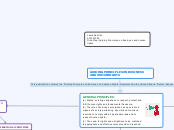Laura Castillo
201321355
MindMap: Guiding Principles on Business and human rights.
GUIDING PRINCIPLES ON BUSINESS AND HUMAN RIGHTS
GENERAL PRINCIPLES:
(a) States’ existing obligations to respect, protect and fulfil human rights and fundamental freedoms;
(b) The role of business enterprises as specialized organs of society performing specialized functions, required to comply with all applicable laws and to respect human rights;
(c) The need for rights and obligations to be matched to appropriate and effective remedies when breached.
III. ACCESS TO REMEDY
26. STATE-BASED JUDICIAl MECHANISMS
States should take appropriate steps to ensure the effectiveness of domestic judicial mechanisms when addressing business.
27.STATE-BASED NON-JUDICIAl GRIEVANCE MECHANISMS
States should provide effective and appropriate non-judicial grievance mechanisms, alongside judicial mechanisms, as part of a comprehensive State-based system for the remedy of business-related human rights abuse.
28.NON-STATE-BASED GRIEVANCE MECHANISMS
States should consider ways to facilitate access to effective non-State- based grievance mechanisms dealing with business-related human rights harms.
29. To make it possible for grievances to be addressed early and remediated directly, business enterprises should establish or participate in effective operational-level grievance mechanisms for individuals and communities who may be adversely impacted.
30. Industry, multi-stakeholder and other collaborative initiatives that are based on respect for human rights-related standards should ensure that effective grievance mechanisms are available.
31.EFFECTIVENESS CRITERIA FOR NON-JUDICIAl GRIEVANCE MECHANISMS
In order to ensure their effectiveness, non-judicial grievance mechanisms, both State-based and non-State-based, should be:
- Legitimate
- Accessible
- Predictable
- Equitable
- Transparent
- Rights-compatible
- A source of continuous learning
25. As part of their duty to protect against business-related human rights abuse, States must take appropriate steps to ensure, through judicial, administrative, legislative that when such abuses occur within their territory and/or jurisdiction those affected have access to effective remedy.
II. THE CORPORATE RESPONSIBIlITY TO RESPECT HUMAN RIGHTS
16.POlICY COMMITMENT
Business enterprises should express their commitment to meet this responsibility through a statement of policy:
-Is approved at the most senior level of the business enterprise;
-Is informed by relevant internal andexternal expertise;
-Stipulates the enterprise’s human rights expectations of personnel;
-Is publicly available and communicated internally and externally to all personnel, business partners and other relevant parties;
-Is reflected in operational policies and procedures necessary to embed it throughout the business enterprise.
17. HUMAN RIGHTS DUE DILIGENCE
In order to identify, prevent, mitigate and account for how they address their adverse human rights impacts, business enterprises should carry out human rights due diligence.
18. In order to gauge human rights risks, business enterprises should identify and assess any actual or potential adverse human rights impacts. They should:
-Draw on internal and/or independent external human rights expertise;
-Involve meaningful consultation with potentially affected groups and other relevant stakeholders.
19. In order to prevent and mitigate adverse human rights impacts, business enterprises should integrate the ndings from their impact assessments across relevant internal functions and processes, and take appropriate action.
20. In order to verify whether adverse human rights impacts are being addressed, business enterprises should track the effectiveness of their response. Tracking should:
-Be based on appropriate qualitative and quantitative indicators;
-Draw on feedback from both internal and external sources, including affected stakeholders.
21. In order to account for how they address their human rights impacts, business enterprises should be prepared to communicate this externally, particularly when concerns are raised by or on behalf of affected stakeholders.
22.REMEDIATION
Where business enterprises identify that they have caused or contributed to adverse impacts, they should provide for or cooperate in their remediation through legitimate processes.
23. ISSUES OF CONTEXT
In all contexts, business enterprises should:
-Comply with all applicable laws and respect internationally recognized human rights, wherever they operate;
-Seek ways to honour the principles of internationally recognized human rights when faced with conflict requirements;
-Treat the risk of causing or contributing to gross human rights abuses as a legal compliance issue wherever they operate.
24. Where it is necessary to prioritize actions to address actual and potential adverse human rights impacts, business enterprises should frst seek to prevent and mitigate those that are most severe or where delayed response would make them irremediable.
11.Business enterprises should respect human rights.
12. The responsibility of business enterprises to respect human rights refers to internationally recognized human rights.
Understanding:
- International Bill of Human Rights.
- International labour Organization’s Declaration on Fundamental Principles.
- Rights at Work.
13. The responsibility to respect human rights requires that business enterprises:
-Avoid causing or contributing to adverse human rights impacts.
-Seek to prevent or mitigate adverse human rights impacts that are directly linked to their operation.
14.The responsibility of business enterprises to respect human rights apply to all enterprises regardless of their size, sector, operational context, ownership and structure.
15. In order to meet their responsibility to respect human rights, business enterprises should have in place policies and processes appropriate to their size and circumstances.
I. THE STATE DUTY TO PROTECT HUMAN RIGHTS
B. OPERATIONAl PRINCIPlES
3. In meeting their duty to protect, States should:
(a) Enforce laws that are aimed business enterprises to respect human rights.
(b) Ensure that other laws and policies governing on operation of business enterprises.
(c) Provide effective guidance to business enterprises on how to respect human rights.
(d) Encourage, and where business enterprises to communicate how they address their human rights impacts.
4.THE STATE-BUSINESS NEXUS
States should take additional steps to protect against human rights abuses by business enterprises that are controlled by the State.
5. States should exercise adequate oversight in order to meet and provide service that may impact international human rights obligations.
6. States should promote respect for human rights by business enterprises through the conduct commercial transactions.
7. Supporting business respect from human rights in conflict-affected areas.
8.Ensuring policy coherence.
9. States should maintain adequate domestic policy space to meet their human rights obligations.
10.States participate in multilateral institutions that deal with business- related issues, such as international trade and financial institutions.
A. FOUNDATIONAl PRINCIPlES
1. States must protect against human rights abuse within their territory by third parties, including business enterprises.
2. States should set clearly the expectation that all business enterprises domiciled in their territory to respect human rights throughout their operations.
This requires:
- Prevent
- Investigate
- Redress
Through effective policies, legislation, regulations and adjudication.









